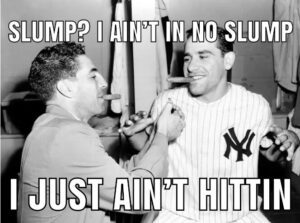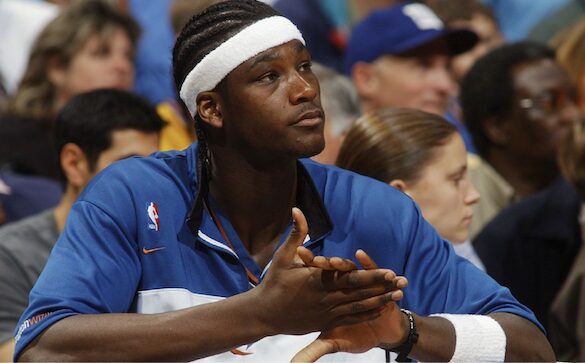Harmful Meme

The video this meme references can be seen linked here.
This graphic shows sports analyst Stephen A. Smith with the caption “Kwame Brown is a bona fide scrub.” This famous quote comes from a rant Smith had live on air talking about a trade between the Los Angeles Lakers and the Memphis Grizzlies. The main pieces from the Lakers were former first overall pick in the NBA draft Kwame Brown and a first round draft pick in exchange for All-Star center Pau Gasol. Smith was asked if the Lakers gave up too much, which prompted a rant about how Kwame Brown was a “bona fide scrub” among other things. The rant about Brown was so long and personal that it went viral online. As memes became more popular into the early 2010s, the rant’s most famous parts were turned into memes.
This meme has a personal connection to me because my friend group has used the meme for years since it is based on a video from 2008. This video popularized the term “bona fide scrub,” which has now been used to reference someone playing bad or having a bad game. The meme is overall negative because it targets someone who was trying their hardest at a sport at the highest level and insults them. It also is only used in negative situations, and represents the idea that someone is always going to be bad at something and they have no potential. The underlying message and idea of this meme is that by calling someone part of the rant (bona fide scrub), you’re effectively saying that they also deserve to be called all of the other parts of the rant.
The effect of this meme is evident when used on a personal level, and there is also evidence that it affected Kwame Brown negatively as well. Brown went on to call out Smith for the disrespectful rant multiple times. Smith said in 2023 “I wish I could do that over, I wouldn’t do it… when I see what he says, I realize how hurt he is.” It is time for this meme to end.
Helpful Meme

This meme could attempt to heal any harm caused by the first meme. I made this meme based on a quote from former MLB player Yogi Berra, “Slump? I ain’t in no slump. I just ain’t hittin.” This quote is a great example of how someone can have a good attitude even if they aren’t at a great point in their sports career. It primarily heals from the last meme, because it has a positive spin to it, and still addresses someone not playing at their best. The meme shows having a good attitude about something, even if there is some sort of problem. It could be used in response to the last meme, and it seems quotable because Berra uses basic language and a short question/answer to get his point across.
I would assume that this meme will not go as viral as my negative example. It does not have a famous video attached to it, which is important in today’s day and age with apps like TikTok that rely on videos for views. Additionally, this meme is less relevant because it references a player who people may not know as much unless they took the time to learn about baseball players of the past. On the other hand, there is a chance the meme could go viral because the players are smoking cigars in what appears to be the team locker room, which is much less common in today’s sports (if it happens at all). This combined with the quotability of Berra’s words may make people think about the meme whenever someone mentions a “slump” in sports. A “slump” is essentially a time when someone has been playing sub-par for an extended period of time.
In order for good news to spread faster than bad news, we have to find ways to show people good news and get them to engage with it online. There are a variety of ways communications organizations could do this. Organizations could adjust their algorithms to support videos that have positive messaging more than videos with negative messaging. These algorithms literally decide what videos are seen by more people and which ones aren’t. On some platforms like YouTube, creators are more likely to receive increased monetization if they follow the community guidelines of the platform. The community guidelines limit things like profanity, but also limit negative ideas like harassment. If other social media platforms were to adopt this policy, the incentives of monetary gain for creating positive/uplifting content may make more creators gear their content towards positivity. Communication organizations could also give users more power with options to hide/limit negative content, even if it is just a temporary switch. Additionally, cultural shifts could include media literacy about negative news and algorithms, having influencers or celebrities repost positive content, and listening to a variety of people/perspectives online.


1 Response
I really like the explanation, as someone who doesn’t know sports really well this illustrates the meaning behind and the ideas behind it as well